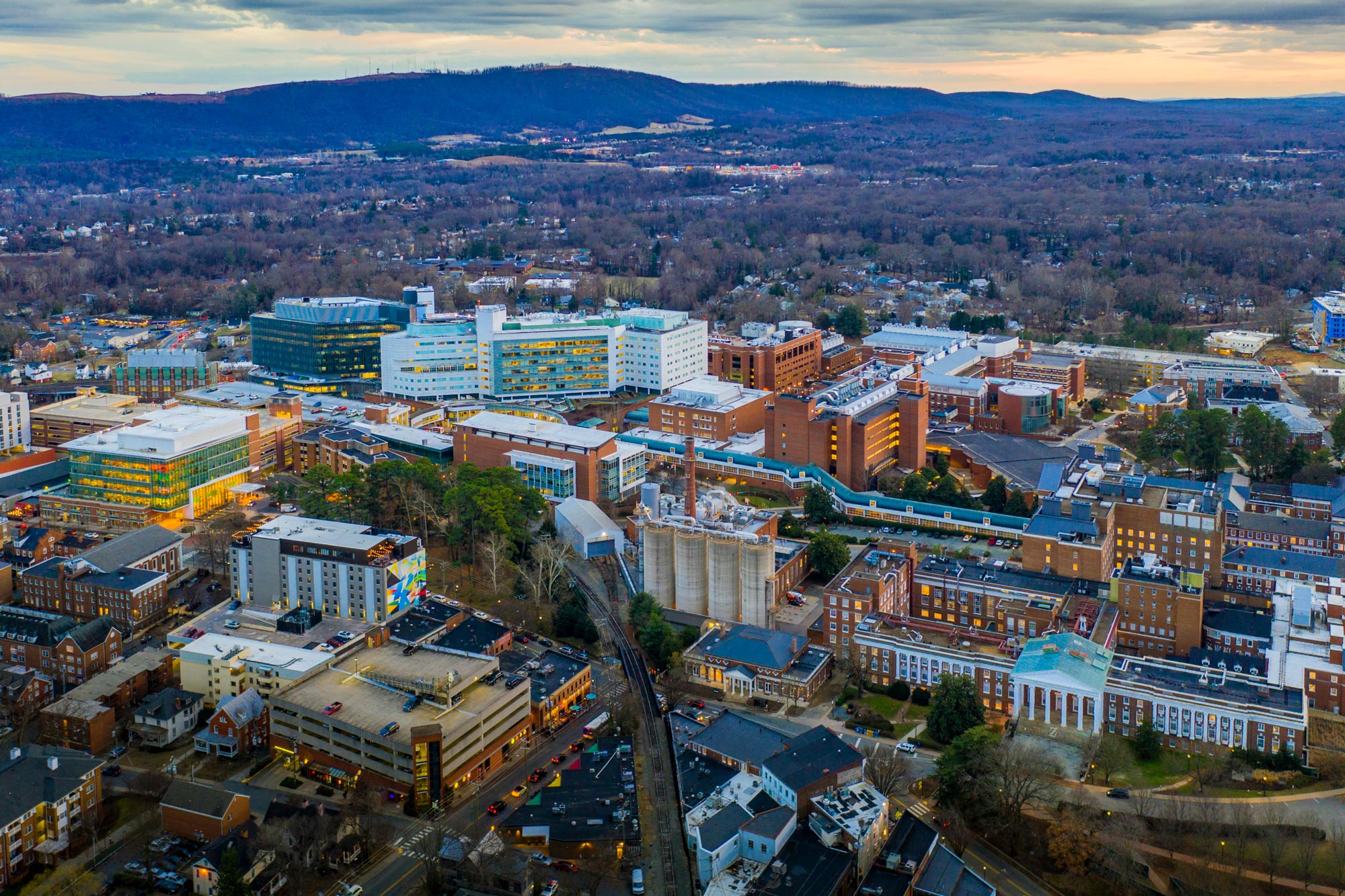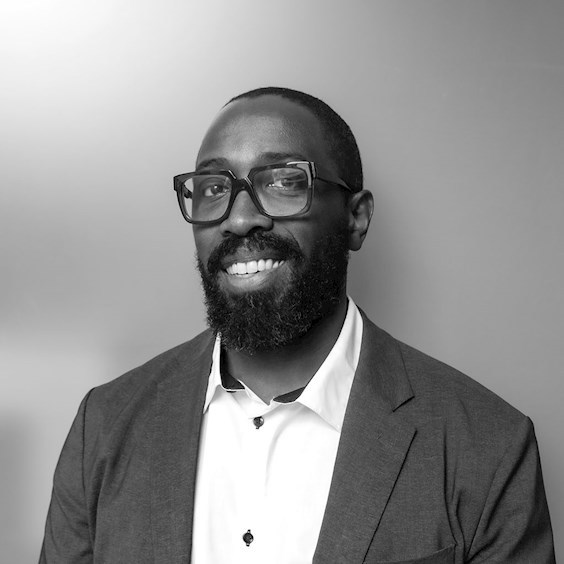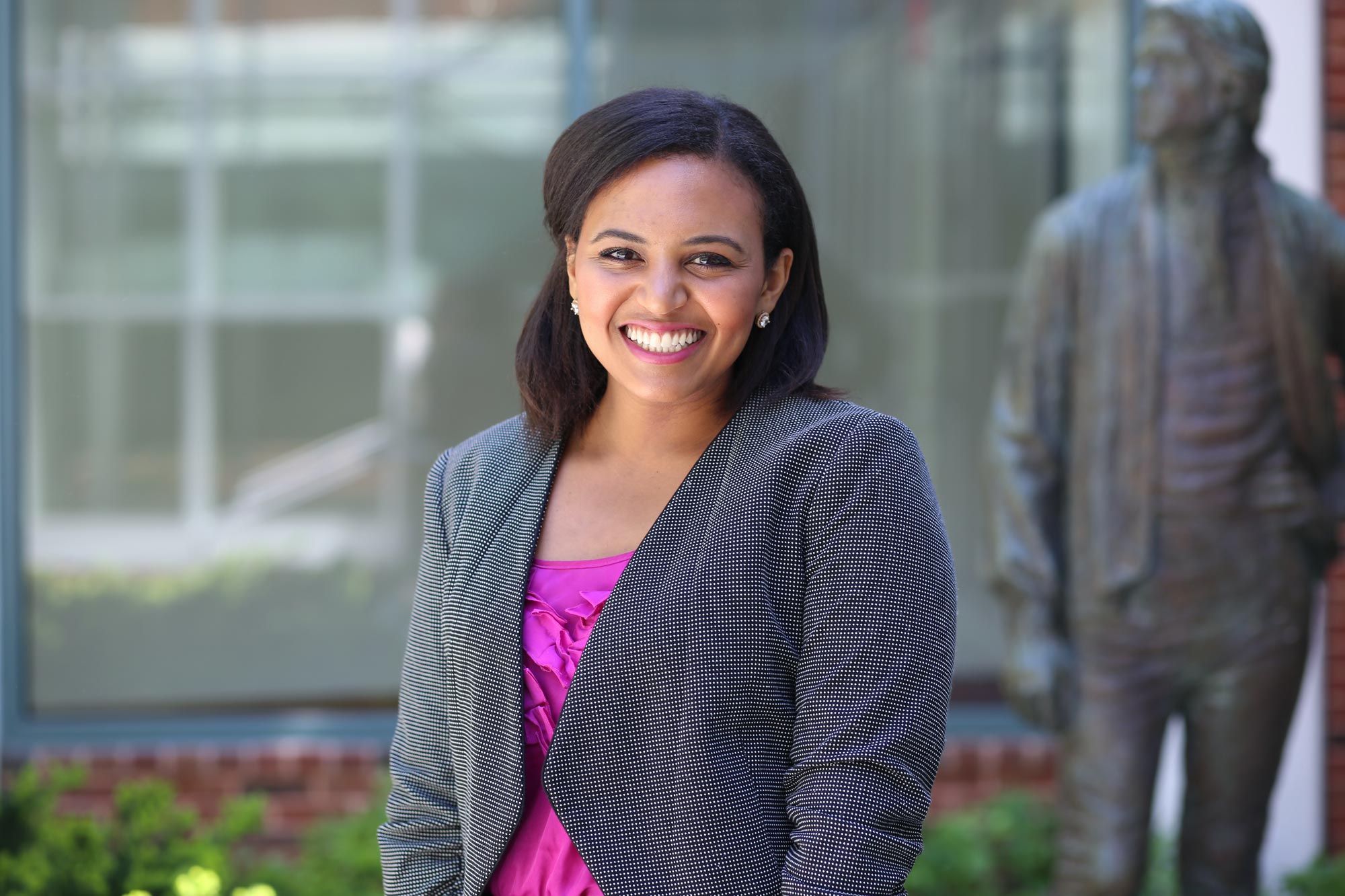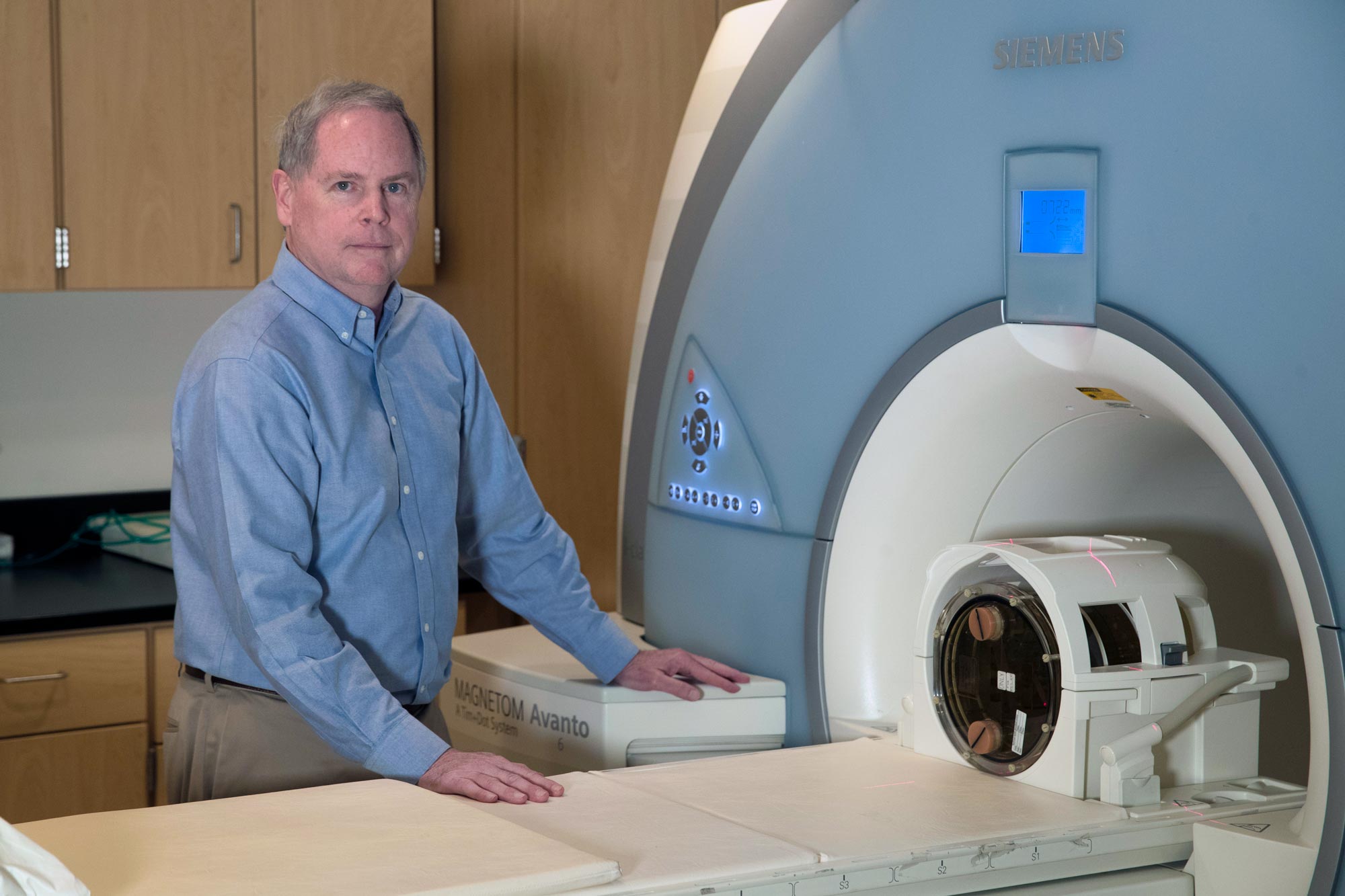The University of Virginia’s John P. Mugler III has been named a fellow by the National Academy of Inventors in recognition of his game-changing work in medical imaging, particularly MRI.
Mugler, of UVA’s School of Medicine and School of Engineering, is one of 168 academic innovators being recognized by the National Academy of Inventors. The NAI Fellows Program salutes “academic inventors who have demonstrated a spirit of innovation in creating or facilitating outstanding inventions that have made a tangible impact on quality of life, economic development and the welfare of society.”
“It is a great honor for my work to be recognized in this way by the National Academy of Inventors,” said Mugler, of UVA’s Department of Radiology and Medical Imaging and the Department of Biomedical Engineering. “Getting to this point would not have been possible without the support and collaboration of wonderful colleagues at UVA and in the medical imaging industry. It is very gratifying to see that techniques developed at UVA have made a difference in the clinical care of patients. As a medical imaging developer, this is the most satisfying outcome that one can achieve.”
Mugler was instrumental in developing innovative pulse sequences that revolutionized magnetic resonance imaging, making it practical to create high-contrast, 3-D images quickly and with high resolution. Previously, MRI machines produced primarily two-dimensional “slices” for clinical imaging, but Mugler’s research allowed for the creation of detailed images that can be viewed from any angle. The increased detail allows doctors to identify subtle abnormalities earlier, leading to better diagnoses and treatment for patients.
Mugler’s work proved so important that it has been implemented in MRIs in hospitals and research institutions around the world.
“John earned this recognition because he has invented multiple major technologies in the field of MRI. All major MRI manufacturers currently provide multiple brain imaging techniques that John invented,” Frederick H. Epstein, chair of UVA’s Department of Biomedical Engineering, said. “The simplest way to describe the impact of John’s work is to say, without exaggeration, that if you or anyone you know has ever had a brain MRI, their resulting diagnosis probably benefitted from John’s inventions.”
Mugler, UVA’s director of medical imaging research, also has been conducting cutting-edge work with hyperpolarized gases for imaging the lungs. These nontoxic, helium- and xenon-based approaches provide high-resolution images far superior to any existing clinical method. UVA is one of the top research and training institutions for lung research using these gases.
Mugler was previously recognized, with his colleague James R. Brookeman, as the 2009 Edlich-Henderson Inventors of the Year by the UVA Patent Foundation, now known as the UVA Licensing & Ventures Group.
The National Academy will induct the new fellows at a ceremony in April.
Developmental Biologist Earns Lifetime Achievement Award
The Society for Developmental Biology will present Raymond Keller, Alumni Council Thomas Jefferson Professor of Biology, with its 2020 Developmental Biology-Society for Developmental Biology Lifetime Achievement Award at its annual meeting in Chicago in July.
This award is given annually “to a senior developmental biologist in recognition of his outstanding and sustained contributions to the field, exceptional mentoring, and service to the scientific community,” according to the society.
Keller’s laboratory uses high-resolution imaging to investigate the riddle of how “tens, hundreds, thousands of embryonic cells act in a coordinated fashion to shape the body plan of multicellular animals,” said Deborah Roach, chair of the Department of Biology. Keller’s pioneering approach, she said, has “provided the field with insights that simply would not have been possible in any other way.”
Outside of the lab, Keller has also had a significant impact on the scientific community and its students.
“Ray’s work, his extraordinary intuition, and his generosity of spirit have inspired developmental biologists since the 1980s, including several here at UVA,” Roach said.
The Society for Developmental Biology is a professional society dedicated to the advancement of the study of how multicellular organisms grow and develop. Its Lifetime Achievement Award is a highly prestigious honor shared by only handful of scientists, including several Nobel Prize winners.
“The international reputation of our department is built on scientists with Ray’s stature,” Roach said. “He is at the very top of his field, and the visibility that his work brings to the department helps us to attract top-quality young faculty and graduate students to our program.”
UVA Rated Virginia’s Top Option for Veterans
Zippia, a career advising website, has rated the University of Virginia as the best institution in the state for veterans seeking a degree.
Citing figures that show UVA students graduate at a 92% clip and that more than 78% of graduates earn more than $28,000 per year, the site said, “Veterans who are looking for a great support system to help ensure they succeed in college would enjoy the University of Virginia’s excellent academics.”
The site rated public universities based on their rates of completion, alumni salaries and the percentage of tuition spent on instruction vs. other administrative costs.
Medical Center Earns National Award for Patient Safety and Quality Care
The UVA Medical Center has been named as a Top Teaching Hospital for patient safety and quality by The Leapfrog Group, a national organization focused on health care safety and quality.
From about 2,100 hospitals evaluated, 120 – including 55 teaching hospitals – earned an award from the organization. Award criteria include patient outcomes and safety measures, practices for safer surgery, maternity care and work to prevent medication errors. UVA’s Top Hospital Award follows an “A” grade earlier this fall on the Leapfrog Hospital Safety Grade.

The UVA Medical Center was named a 2019 Leapfrog Top Hospital for its attention to safety and quality care. (Photo by Sanjay Suchak, University Communications)
“We are pleased to recognize UVA Medical Center as a 2019 Leapfrog Top Hospital,” said Leah Binder, president and CEO of The Leapfrog Group. “This demonstrates extraordinary dedication to patients and to the Charlottesville community. We congratulate the board, staff and clinicians whose efforts made this honor possible and know they share pride in this achievement.”
Be Safe, UVA Health’s nationally recognized safety and quality program, provides a disciplined daily method to help drive excellent patient safety and outcomes for their patients.
“Supported by our Be Safe framework, our care providers are focused on constantly improving the care we provide our patients,” said Dr. Tracey Hoke, chief of quality and performance improvement at UVA Health. “I am pleased to see their efforts recognized by The Leapfrog Group.”
UVA Places 8 Influencers in ‘Edu-Scholar’ Rankings
The Curry School of Education and Human Development’s Carol A. Tomlinson leads eight UVA scholars among the nation’s top 200 in the annual “RHSU Edu-Scholar Public Influence Rankings,” published in January in the “Rick Hess Straight Up” blog, part of Education Week’s online offerings.
The blog seeks to rank “the university-based scholars in the U.S. who did the most last year to shape educational practice and policy,” Hess wrote. “Simply being included in this list of 200 scholars is an accomplishment, given the 20,000 or more who might qualify.”
The selections take into account academic and media citations, social media references, book sales and other measures of influence. A committee of educational scholars – including Curry School Dean Robert C. Pianta – assisted Hess with compiling the listings.
Tomlinson came in at No. 12, two spots ahead of UVA psychologist Daniel Willingham, making UVA one of five institutions with multiple entries in the top 20.
Pianta came in at No. 35. The Curry School’s Sarah Turner made one of the largest jumps from last year, advancing to No. 42.
Other UVA scholars making the list were sociologist Josipa Roksa (No. 141) and the Curry trio of Benjamin L. Castleman (No. 153), James Wyckoff (No. 158) and Daphna Bassok (No. 185).
Architecture School Professor’s Contributions to Diversity Recognized
The Association of Collegiate Schools of Architecture awarded Elgin Cleckley, an assistant professor of architecture and design thinking in the School of Architecture, a 2020 Diversity Achievement Award for his project, “_mpathic design: pedagogy, initiative, practice.”
The award, which seeks “to recognize the work of faculty, administrators, or students in creating effective methods and models to achieve greater diversity in curricula, school personnel, and student bodies, specifically to incorporate the participation and contributions of historically under-represented groups or contexts,” will be presented at the organization’s annual meeting, to be held March 12-14 in San Diego.

Architecture School Dean Ila Berman called Elgin Cleckley, above, “one of the strongest voices for inclusion, diversity and equity at the School of Architecture and University.”
Cleckley, a design thinking expert, in June received the UVA Black Faculty and Staff-Employee Research Group’s Armstead Robinson Recognition Award for Faculty, which recognizes outstanding faculty who have contributed to diversity, equity and inclusion and have had a positive impact on the black experience at the University.
At the time, Architecture School Dean Ila Berman wrote, “Professor Cleckley is one of the strongest voices for inclusion, diversity and equity at the School of Architecture and University. ... [He is] the co-chair of our Inclusion + Equity committee and has taken a leadership role in cultivating a diverse community at the School of Architecture. Under his leadership, the committee has defined a set of clear goals stating that the project of the committee and school is not simply about including people of varied backgrounds, identities and experiences, but rather of committing ourselves to the sustained, critical rethinking of our institutional policies, practices, structures and culture.
“As part of this process, Professor Cleckley has been leading a racial equity assessment at the School of Architecture with the Racial Equity Institute, committed himself to curricular programming and research that looks at the complicated and difficult racial past of the University and the many historical sites in its vicinity, and is in the process of developing pipeline programming to strengthen our racial diversity within the student body at the school.”
UVA Orthopedics Honored Among Nation’s Top Orthopedics Programs
Becker’s Hospital Review has named UVA Orthopedics at UVA Medical Center to its list of 100 hospitals and health systems with great orthopedics programs. This is the sixth consecutive year UVA Orthopedics has received this national award.
In their introduction to the list, the editors of Becker’s Hospital Review note that the programs honored have been recognized for both quality care and patient satisfaction. “These programs highlighted have rich histories of innovation and have won grants to research musculoskeletal treatments,” they write.
In its write-up on UVA, Becker’s noted that surgical infection rates at UVA were better than the national average in 2018, as was the average length of stay for hip fracture patients. Becker’s also highlighted that UVA has earned recognition from Blue Cross Blue Shield as a Blue Distinction Center for knee and hip replacement and was the first hospital in Virginia to receive premier certification from the International Geriatric Fracture Society.
“This Becker’s Hospital Review award reflects the quality of the care we provide as well as the breadth of the specialized care we provide – from sports medicine and hand surgery to spinal surgery and joint replacements – for patients from across Virginia and beyond,” said Dr. Bobby Chhabra, chair of UVA’s Department of Orthopaedic Surgery. “I’m grateful to our team in the department, together with our partners across UVA Health, for their service to our patients.”
Becker’s Hospital does not rank its 100 great orthopedic programs and lists them in alphabetical order.
Law Student Honored for ‘Courage, Perseverance, Commitment to Justice’
Erin Seagears, a third-year student at the School of Law, is this year’s recipient of the school’s Gregory H. Swanson Award, named in honor of UVA’s – and the Law School’s – first black student. The award recognizes students who demonstrate courage, perseverance and a commitment to justice within the community.
Seagears received the award Jan. 21 as part of UVA’s Community MLK Celebration event at the Law School.

Law student and undergraduate alumna Erin Seagears received the Gregory H. Swanson Award, which recognizes students who demonstrate courage, perseverance and a commitment to justice within the community. (Photo by Julia Davis, UVA School of Law)
“I first learned of Gregory Swanson in undergrad at UVA while training to be a tour guide,” said Seagears, who earned a bachelor’s degree in political and social thought from the University. “I remember being so inspired by his story, and now I feel incredibly honored to receive this award in tribute to his legacy. Winning this award definitely encourages me in my pursuit for justice and motivates me to always fight for what’s right, even if what I’m trying to achieve has never been done before and no matter the adversity.”
At UVA Law, Seagears was elected to the Raven Society; served as co-president of the student board of the Program in Law and Public Service; worked on the Virginia Journal for Social Policy & the Law; received summer fellowships to intern in public service roles; mentored students as a peer adviser; and was the Student Bar Association’s representative to the UVA Student Council. She has also clerked for Judge Richard Moore of the Charlottesville Circuit Court.
After law school, Seagears will clerk for Judge John Nugent of the Circuit Court for Baltimore City. She said she hopes to one day become a juvenile court judge to help divert children from incarceration and equip them with the support they need to have a productive life.
The award, launched in 2018 during a commemoration ceremony of Swanson’s time at UVA, is meant to recognize students with traits he embodied. Swanson attended UVA Law during the 1950-51 academic year as an LL.M. student after winning a federal lawsuit aided by the NAACP Legal Defense Fund.
Professors Elected to American Law Institute
Law professors Ashley Deeks and Deborah Hellman were recently elected as members of the American Law Institute.
There are now 26 members of the School of Law faculty currently affiliated with institute.
The institute is the leading independent organization in the United States producing scholarly work to clarify, modernize and otherwise improve the law. The organization includes judges, lawyers and law professors from the United States and abroad, selected on the basis of professional achievement and demonstrated interest in improving the law.
Deeks and Hellman, who both joined the Law School faculty in 2012, were among 45 new members inducted in December nationwide.
Deeks is the E. James Kelly, Jr. Class of 1965 Research Professor of Law and a senior fellow at the Center for National Security Law, and at the Miller Center. She is also a member of the State Department’s Advisory Committee on International Law and formerly served as the assistant legal adviser for political-military affairs in the U.S. State Department’s Office of the Legal Adviser.
Hellman is the David Lurton Massee, Jr., Professor of Law and Roy L. and Rosamond Woodruff Morgan Professor of Law. Her article “A Theory of Bribery” won the 2019 Fred Berger Memorial Prize (for philosophy of law) from the American Philosophical Association. Hellman and Professor Michael Gilbert are inaugural scholars in UVA’s Corruption Lab on Ethics, Accountability, and the Rule of Law, also known as CLEAR.
Among the newly elected American Law Institute members are UVA Law alumnae Joyce White Vance (Class of 1985), a University of Alabama School of Law professor and a former U.S. attorney; and Helgi C. Walker (Class of 1994), a partner in Gibson, Dunn & Crutcher’s Washington, D.C., office.
Members were selected from confidential nominations submitted by institute members.
MS Society Honors Nursing Grad Student
The National Multiple Sclerosis Society honored UVA Doctor of Nursing Practice student Susan Stuart with a 2019 “Breakthroughs Award” at a Jan. 25 ceremony with society president Chartese Berry.
Stuart, a nurse practitioner and director of nursing for Medstart Georgetown University Hospital’s Multiple Sclerosis Patient-Centered Specialty Practice, noted a gap in care for newly diagnosed multiple sclerosis patients and created a novel, nurse-led intervention to help them understand, cope and thrive in the critical stage between diagnosis and their first specialist appointment.
The award is for work Stuart did at Georgetown that is part of her capstone project, done with mentor professor Elizabeth Friberg.
Law Professor Appointed to FCC Advisory Subcommittee
Law professor Thomas Nachbar has been appointed to a Federal Communications Commission advisory subcommittee that’s helping to make sure callers’ voices won’t get cut off in case of an emergency.
The Communications Security, Reliability and Interoperability Council provides the FCC with recommendations that promote the resiliency of the nation’s communications systems.
Nachbar will serve as a member of the subcommittee that is looking at security vulnerabilities affecting Session Initiation Protocol, the signaling technology that makes possible the creating, modifying and terminating of electronic communications sessions. These sessions include internet telephone calls and other types of multimedia conferencing and distribution.
Because SIP is used to initiate voice sessions, it is also important for 911 service. The FCC has directed the council to develop best practices to address any vulnerabilities.
Nachbar has both practiced and published in the field of telecommunications law. He authored, with professor emeritus Glen Robinson, the casebook “Communications Regulation.” His research focuses on the nature of regulation: how the law is used (and by whom) to shape and control behavior.
He is also an expert in national security law, and serves as a judge advocate in the U.S. Army Reserve and as a senior fellow at the Center for National Security Law.
Student Articles Win Legal Writing Competitions
Two UVA Law students and a recent alumnus have won prominent legal writing competitions.
David Rubin, who graduated last spring, won the International Fiscal Association-USA Branch’s 2019 Writing Competition for the best scholarship exploring any topic relating to U.S. taxation of income from international activities, including taxation under U.S. tax treaties.
Rubin said in his paper, written while he was a student, that Brexit could have serious consequences for U.K. nationals and corporations that are currently taking advantage of U.S. tax treaties because of a U.S. safe-harbor provision that extends benefits to residents of states in the European Union.
“I figured the best way to determine what would be interesting to international tax practitioners was to ask one, so I posed the question to one of the co-chairs of the Gibson Dunn tax practice group, who is a UVA Law alum,” Rubin said. “He suggested a couple of topics, and I found this one particularly fascinating given Brexit’s potential impact on the global economy.”
His paper, “EB or Not EB? That Is the Question Treasury Must Answer After Brexit,” referring to equivalent beneficiaries, looks at the U.S. government’s options for addressing the issue. He analyzes benefits and downsides of each option, and concludes that the most workable path is for the Treasury Department to preserve the status quo by entering into intergovernmental agreements with its treaty partners.
Professor Ruth Mason, an expert in international tax law, served as Rubin’s faculty sponsor.
“I am very lucky to have worked with Professor Mason and others on this project during my time at UVA Law,” Rubin said. “Professor Mason provided guidance while I initially mapped out my arguments, and our conversations throughout the entire process oriented me in the right direction when my research began to get too scattered or hit a dead end.”
At UVA Law, Rubin was a member of the 2018 International and European Tax Moot Court team, the first U.S. squad to win the competition. He served as student coach for the 2019 team, which also won.
Rubin is currently an associate in the Los Angeles office of Gibson Dunn & Crutcher.
Additionally, third-year students Justin Aimonetti and Christian Talley won the Stanford Law Review’s inaugural Student Essay Competition with “Game Changer: Why and How Congress Should Preempt State Student-Athlete Compensation Regimes.”
They argue that Congress should intervene to regulate student-athlete compensation to prevent a state-by-state approach that could undermine national uniformity in college sports.
Essays were selected through an anonymous review process that considered the novelty of the piece and its contribution to existing scholarship, clarity and writing style, support from citations and interest to a general audience.
Aimonetti, who is also an M.A. candidate in legal history, serves as an articles editor on the Virginia Law Review and is a member of the Supreme Court Litigation Clinic. Talley serves as a notes and comments editor on the Virginia Law Review, a research assistant for professor Saikrishna Prakash and a Legal Writing Fellow mentoring first-year law students.
Media Contact
Article Information
February 7, 2020
/content/accolades-uva-medical-imaging-expert-named-national-academy-inventors

